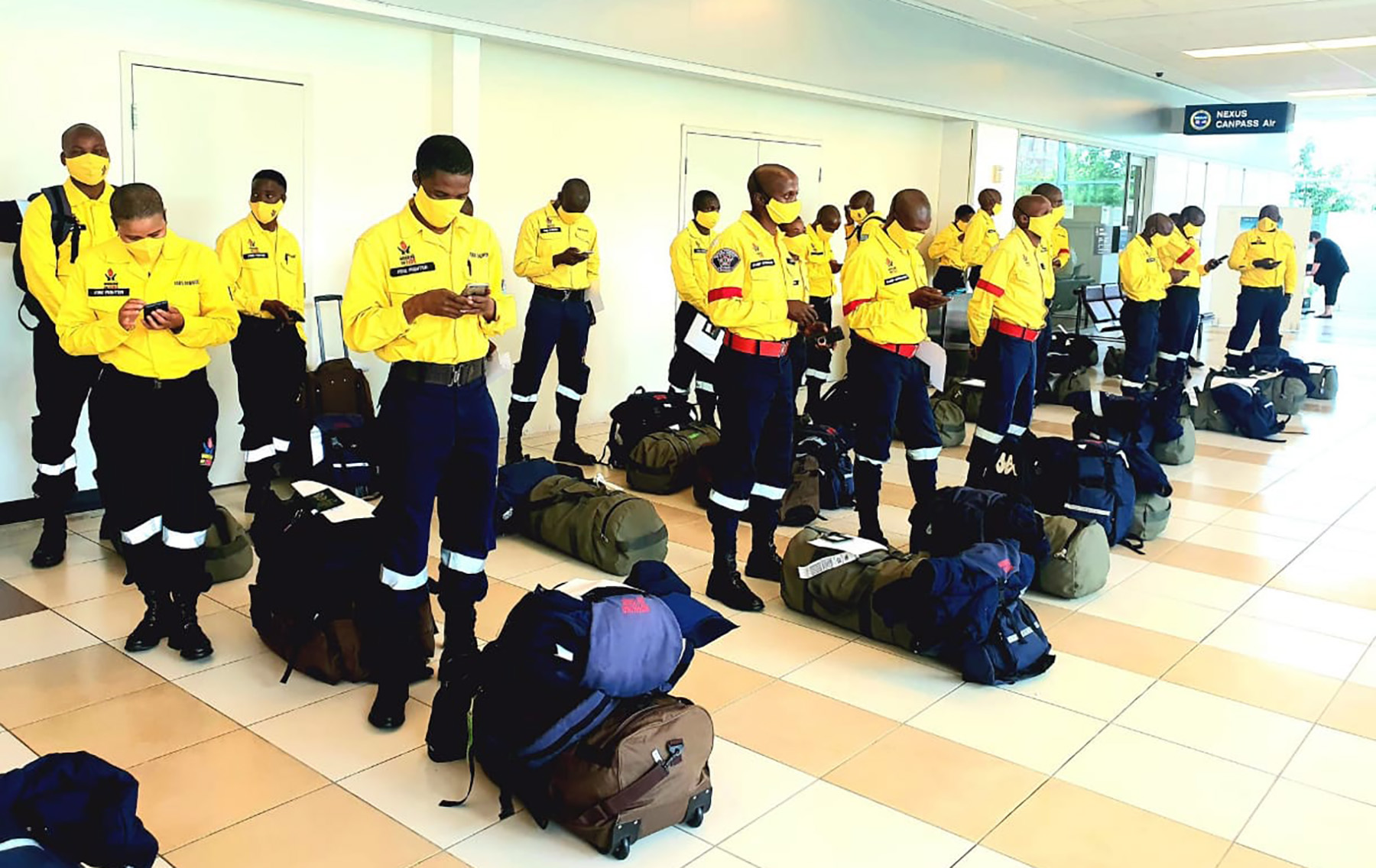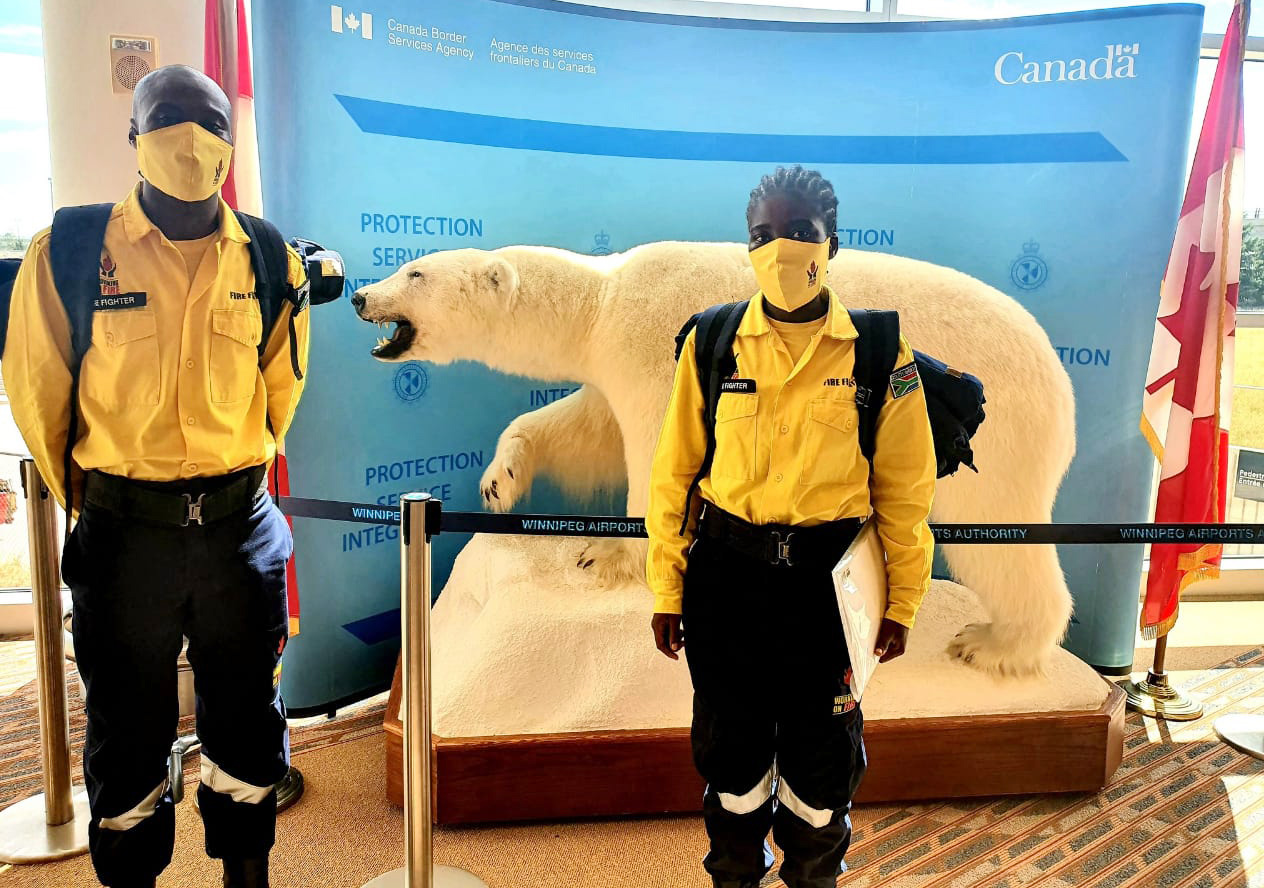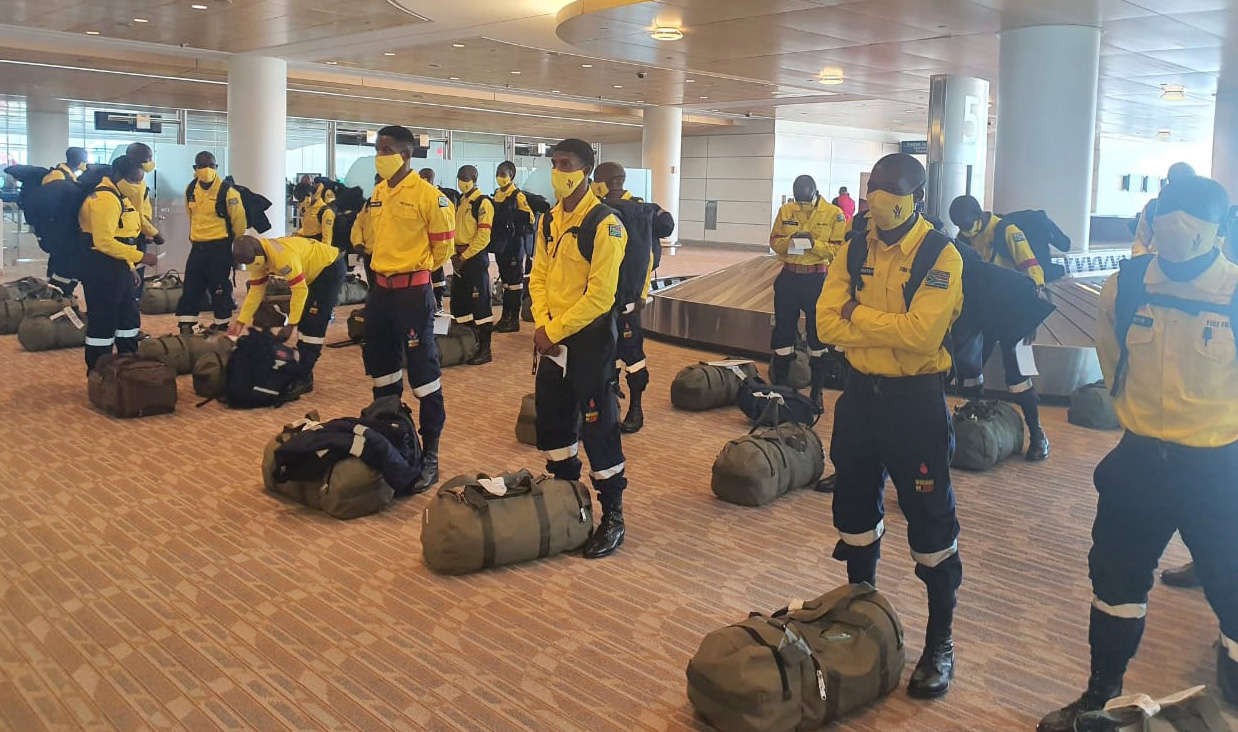Our planet is burning.
And this week, with reports of wildfires in the Northern Hemisphere spreading… well, like wildfire, the evidence became irrefutable.
On Tuesday night, 10 August 2o21, 109 firefighters and managers from the Department of Forestry, Fisheries and the Environment’s Working on Fire programme were deployed to Manitoba in Canada to assist with firefighting efforts in that province.
 Over 100 South African firefighters were deployed to help fire fighting efforts in Canada. (Photo: Working On Fire)
Over 100 South African firefighters were deployed to help fire fighting efforts in Canada. (Photo: Working On Fire)
The fires, rapidly spreading across the western provinces of Canada, are a result of the recent record-breaking heat and dry weather the country has experienced. These unusual weather conditions and the resulting wildfire crisis, which other countries in the Northern Hemisphere have also experienced, point to the magnitude and severity of global warming.
Professor Francois Engelbrecht, who was the lead author of the International Panel on Climate Change (IPCC) Special Report on Global Warming of 1.5ºC in 2018 and the IPCC’s Sixth Assessment Report (published this week), says wildfires have increased in recent years, in both magnitude and frequency.
“There’s no denying that these big mega fire events are occurring more frequently across the world,” said Engelbrecht, “it’s a clear fingerprint of climate change. And the more frequent occurrence of these types of fires has been projected for at least two decades. So it’s not a surprise at all to climate science.”
Drier conditions, combined with extreme heat, are apparent along the southern tip of Africa, south-east Australia, the Mediterranean, California and the Arctic region, including Canada.
Engelbrecht says that these events are all fingerprints of the same climate change impacts.
The reason warming temperatures have led to an increase in wildfires is that they create the ideal conditions for fires to start.
“So certain regions of the world are warming particularly fast, and with that average temperature increase, the important thing which is relevant to fires are heatwave events, which is a period during which the temperatures are exceptionally high.”
Engelbrecht explains that during a heatwave, the risk of a mega fire is greater due to a lack of cloud cover, no moisture and exceptional heat.
Heatwaves, droughts and dry spells are caused by high-pressure systems.
“For example, in south-eastern Australia, we’ve seen the big bushfires, a loss of about 10% of the rainfall has thus far been recorded over the last several decades. And in south-western Australia it’s about 20%.”
The three environmental factors that create an ideal situation for a wildfire to start are: prolonged seasons of low rainfall, very high temperatures and strong winds.
Engelbrecht cites the Knysna fires of June 2017 as an example. “Those fires occurred following one of the driest and also historically, the warmest autumn on record.
“You had three consecutive years of drought. It was in the middle of the big Cape Town drought. And so the vegetation was as dry as it can be, especially after that exceptionally hot autumn. And then, when a fire started, during that specific event, just by coincidence, there was a weather system moving past the southern part of the country that generated very strong north-westerly winds.
 The firefighters, part of the Working On Fire programme, upon their arrival in Winnipeg, Canada. (Photo: Working On Fire)
The firefighters, part of the Working On Fire programme, upon their arrival in Winnipeg, Canada. (Photo: Working On Fire)
“So then you add ideal conditions – you had dry vegetation, very high temperatures. And then the third factor, very strong winds that helps the spread of the fire.”
In Arctic regions, including Canada, the combination of record temperatures, plenty of vegetation to burn and heatwaves causes the mega wildfires.
Linton Rensburg, spokesperson for Working on Fire explains that wildfires are caused when vegetation (plantations and forests) are fuelled by ignition points caused by humans or lightning, which are further fuelled by hot, dry and windy weather conditions.
“If you combine the impact of global warming and climate change, then we see longer fire seasons, but critically we see more intense fires burning over longer periods,” says Rensburg.
“And certainly one can see in Turkey and Greece, this scenario where massive wildfires [causes] havoc and high temperatures [exceeding] 40ºC.”
Canada is not the only place experiencing extreme wildfires. Parts of the United States (California), Greece and Turkey are also experiencing deadly wildfires as a result of extreme temperatures.
Rensburg adds, “In Canada, this is also appearing to be becoming more evident with the increase in wildfires year-on-year. It is a phenomenon that the world, including South Africa, will have to deal with. Greater and quicker initial attack response to firefighting efforts, better coordination but also a sustained effort to mitigate against the impact of global warming and climate change [are needed].”
On Tuesday, 10 August, the DFFE announced that due to the number of provinces experiencing high fire risk, “Canada is close to exhausting available wildland fire management resources within the country.”
Rensburg told Daily Maverick that on Wednesday, the Manitoba Wildfire Services indicated that it was battling close to 150 fires, and the fires to date this year had already exceeded those of previous years.
The request for South African firefighters came from the Canadian Interagency Forest Fire Centre (CIFFC), in terms of a Memorandum of Understanding, which provides for the exchange of wildland fire management resources between South Africa and Canada. This was the fourth deployment of South Africa firefighters to Canada.
The South African High Commissioner to Canada, Sibongiseni Dlamini-Mntambo noted that South Africa’s immediate response to Canada’s call for assistance, demonstrates the good working relations which exist between the two countries.
Rensburg says that the interagency forest fire centre, which is responsible for mobilising national and international firefighting resources, indicated this week that its resources are limited and that firefighters from Mexico and Australia have already joined them in Canada.
The USA, he says, was unable to assist. “Unfortunately, the USA is also in the midst of their fire season which has also been exacerbated by extreme heat, dry conditions and strong winds. It was just not possible for the USA to send firefighters as all of them were busy and on standby in their own country.”
The WOF programme is administered through the Expanded Public Works Programme and provides work opportunities, skills training and personal development to communities across the country, mostly young people, with about 30% women.
The WOF firefighters arrived in Winnipeg on Wednesday afternoon on a chartered flight, arranged by the CIFFC.
The firefighters are doing well, he says. “They have spent the first few days being orientated into the conditions in Manitoba, Canada [sic].
“[They have been] updated on the map readings in Canada and also extensive education and awareness on Covid-19 protocols in Canada. We do expect them to get active on the fire line over this coming weekend.”
Manitoba has about 400 firefighters.
Manitoba Minister of Conservation and Climate, Sarah Guillemard, tweeted on Wednesday, “We welcome the arrival of South African firefighters to assist Manitoba in fighting the ongoing challenge of wildfires in the province.”
Rensburg said recent rainfalls across the province will help ground crews in their fire suppression efforts. Manitoba currently has 143 active wildfires burning across the province and 431 wildfires this year.
 Over 100 South African firefighters were deployed to help fire fighting efforts in Canada. (Photo: Working On Fire)
Over 100 South African firefighters were deployed to help fire fighting efforts in Canada. (Photo: Working On Fire)
The WOF firefighters will be deployed in Canada for 34 days.
On Tuesday, the DFFE assured South Africans in a statement that this deployment would not detract from local firefighting efforts: “We also understand that we are currently amid our 2021 winter fire season. However, as with previous deployments, we want to reassure our partners and stakeholders that this deployment will in no way have an impact on our current firefighting resources in South Africa, where the Working on Fire programme is able to call on close to 5,000 firefighters spread throughout the country.” DM/OBP




 Over 100 South African firefighters were deployed to help fire fighting efforts in Canada. (Photo: Working On Fire)
Over 100 South African firefighters were deployed to help fire fighting efforts in Canada. (Photo: Working On Fire) 